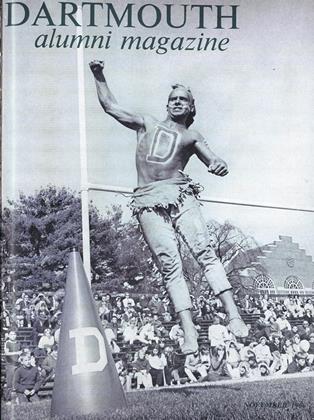By Prof. John G. Kemeny (Mathematics).Englewood Cliffs, N. J.: Prentice-Hall,Inc., 1964. 163 pp. $4.95.
This stimulating and provocative little book is highly recommended to anyone who is even slightly interested in problems related to education or computers - and that includes nearly everybody. Author John Kemeny makes reading on some rather deep and controversial topics a pleasure, for he combines a knack of stating ideas simply and lucidly with a liberal mixture of surprise and humor. For example, he likens the computer as an extension of man's brain to the bulldozer as an extension of his brawn.
During this evening with Professor Kemeny, the reader will find himself on a conducted tour of the author's thoughts and actions in three of his favorite haunts, mathematics, education, and computers, with frequent flag stops at a fourth, sports. The trip touches on episodes of the recent past - his six-week trip as a missionary (mathematical), and a look behind the scenes in the development of Dartmouth's famous threecourse three-term program. It contains many critical views of the present - an attack on unimaginative and outmoded curriculum and teaching methods in our schools together with proposed changes, and caustic comments about how undue emphasis on research is taking college teachers away from teaching. It grants some remarkable glimpses into the future - the education of the wellrounded egghead, and the amazing computerized library of 2000 A.D.
Professor Kemeny permits no sacred cows (except for the Brooklyn Dodgers). He attacks high school teachers, deans, city planners, and the National Science Foundation. His ability as a seer has been demonstrated in that many of his suggestions have already come to pass. Though even at Dartmouth we have not yet inaugurated the Kemeny Plan for Well-rounding (q.v.), the recent changes in the distributive requirement and the opportunity for students to enroll in two courses per year without a recorded grade (the "pass-fail" option) go a long way toward implementing it. And the Dartmouth Computation Center is a marvelous monument to the optimistic picture painted in the last chapter of the book.
To read these random essays is to share the intimate views of their author. Although presented in a convincing and stimulating way, these views are so provocative and in some cases so radical that hardly anyone will agree with all of them. Yet they will cause the reader to think critically about his own and the author's ideas.
Do not turn away from this book because its author is a mathematician. It was written for all to read and ponder.
Professor of Mathematics
 View Full Issue
View Full Issue
More From This Issue
-
 Feature
FeatureNotes on the New Europe
November 1966 By Bernard D. Nossiter '47 -
 Feature
FeatureCHAIRMAN'S REPORT 1905-1966 CAMPAIGN
November 1966 By Rupert C. Thompson. Jr. '28 -
 Feature
FeatureTHE RACE TO BE HUMAN
November 1966 -
 Feature
FeatureMoosilauke Area Doubled
November 1966 By Robert S. Monahan '29 -
 Feature
FeatureFederal Judge
November 1966 -
 Feature
FeatureNorth Country Doctor
November 1966
Books
-
 Books
BooksHIGHWAY ENGINEERING.
July 1955 By CARL F. LONG -
 Books
BooksBecoming Yankees
SEPTEMBER 1981 By David M. Shribman '76 -
 Books
BooksIDEOLOGIES AND UTOPIAS: THE IMPACT OF THE NEW DEAL ON AMERICAN THOUGHT.
JANUARY 1972 By ELMER E. Smead -
 Books
BooksNEIGHBORHOOD GROUPS AND URBAN RENEWAL.
JULY 1966 By FRANK SMALLWOOD '51 -
 Books
BooksTRIAL AND TERROR,
November 1949 By H. M. Dargan -
 Books
BooksFaculty Books
January 1953 By JUDSON S. LYON '40

